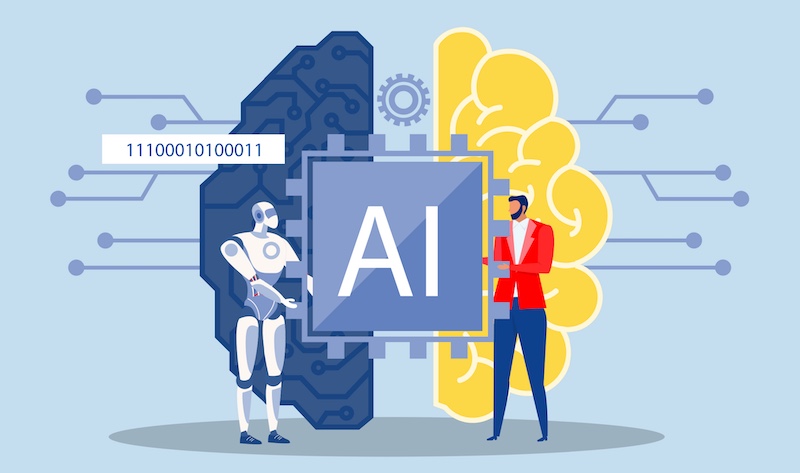While artificial intelligence (AI) role in B2B marketing to rise, a new survey details how organizations that prioritize AI strategy, data infrastructure and upskilling now will be best positioned to compete—and win— in the next era of marketing.
That is the conclusion of Conveyor Marketing Group’s “How AI Will Define B2B Marketing Success in 2030” report, providing insights into the AI adoption and knowledge trends and challenges B2B marketers across various industries and company sizes are experiencing. The study highlights how AI is quickly becoming a foundational part of the B2B marketing toolkit and the growing role it will have over the next five years.
Based on a survey conducted from January 28 – March 4, 2025, every respondent expect moderate adoption of AI in their marketing efforts by 2030. Over 70% anticipate that up to half of their marketing will be AI-driven, while a smaller group anticipates more significant integration at 51– 75%. Only about 4% expect near-complete AI adoption. This suggests a cautious but steady trajectory toward AI adoption, with most organizations taking a measured approach rather than forecasting full-scale automation
Divide in B2B Marketing
While AI usage in marketing is significant, few companies think they’re using AI to its full potential; just 6% of respondents classified their integration as “Excellent.” Most placed themselves in the middle of the curve— 36% rated their efforts as “Average.” A roughly equal number see their usage as “Good” (23%) and “Poor” (25%). We saw a similar pattern for team knowledge about AI; 41% of respondents are “Somewhat Familiar” and less than 3% are “Extremely Familiar.”
Jason Johnston, founder and CEO of Conveyor, highlighted that the data shows an AI divide in B2B marketing. “Everyone’s talking about the 90% AI adoption rate like it’s a victory lap,” said Johnston. “While enterprises throw millions at AI teams and training, SMBs are deploying what I call ‘prayer-based AI’; copy-paste tools with zero strategy, hoping for miracles. The shocking part? When SMBs actually invest in proper AI implementation, they’re seeing much better margins than their enterprise counterparts.
Marketing Teams Expect Job Shifts
The findings reveal a sector in transition. While AI is now widely used for content creation, email marketing and personalization, adoption is uneven. Skill gaps, budget constraints and integration challenges are holding many teams back. Larger enterprises are leading the way, while smaller companies are moving more cautiously.
While there are concerns reported about AI reducing the workforce, AI may not be the job killer that many fear—only 11% believe there will be no change at all on their teams due to AI by 2030. In fact, 61% of respondents expect that job reskilling on AI will be a major team need, suggesting a hybridization of AI and human talent rather than a simple replacement.
Fourteen percent believe that the number of jobs will increase because of AI, with mid-sized companies being the most optimistic about AI creating jobs, while 13% believe jobs will be replaced.
Key Tools Needed
Content has been king in marketing for the last decade, and expertise related to building and promoting content has often topped the list of the most coveted marketing skills. However, AI is shifting the landscape. When B2B marketers look to 2030, they see the following skills as those their teams must master:
- 78% – AI Tools Mastery
- 73% – Strategic Thinking
- 51% – Ethical Decision Making
- 47% – Data Science
- 42% – Storytelling
Because the biggest obstacle to using AI in B2B marketing is that teams don’t know how to use it yet, the skills shortage can be overwhelming to organizations who already feel like they are behind in their AI efforts. By 2030, AI is expected to drive a significant share of marketing efforts, from predictive targeting and campaign automation to real-time personalization and performance analytics.
A Roadmap Forward
For those just getting started, the report includes resources that will help their teams adopt and use AI successfully. Some of the key tips featured include establishing ethical guardrails, especially if you’re experimenting with generative tools. If you don’t have a formal AI policy yet, now’s the time to create one; create an interdisciplinary AI-focused task force to help drive AI use cases; and invest in AI literacy across the team, including basic training on tools, terminology and ethical implications. Focus on enabling marketers to work with AI, not be replaced by it.
This isn’t David versus Goliath anymore; it’s David with a properly calibrated slingshot versus Goliath stumbling around with expensive toys he doesn’t know how to use,” said Johnston.







